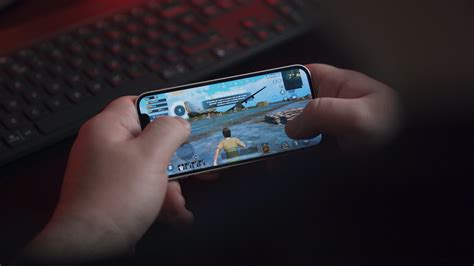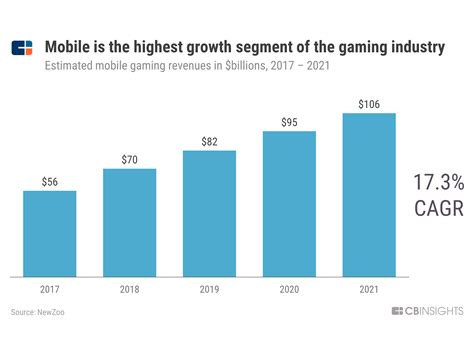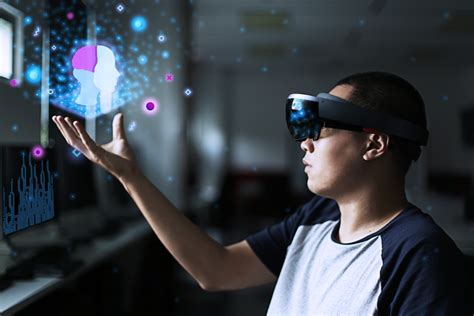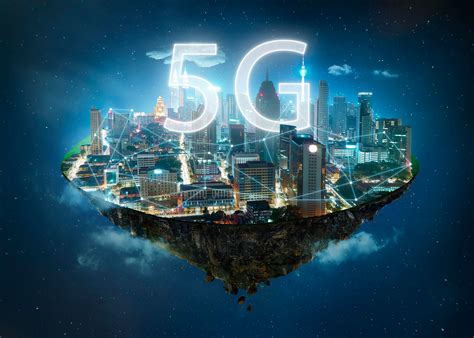Breaking News


Popular News


Discover the latest trends in mobile gaming, including augmented reality, 5G impact, AI integration, emerging technologies, and evolving gaming experiences. Stay ahead in mobile gaming technology.Mobile gaming has rapidly evolved over the past decade, experiencing a surge in popularity and innovation. From the introduction of augmented reality to the integration of artificial intelligence, the future of mobile gaming technology is shaping up to be truly groundbreaking. In this blog post, we will explore the current trends in mobile gaming and how they are shaping the industry. We will also delve into the rise of augmented reality in gaming, the impact of 5G on mobile gaming, the integration of artificial intelligence in games, and the emerging gaming technologies and devices that are revolutionizing the way we play. Join us as we take a closer look at the evolution of mobile gaming experiences and what the future holds for this exciting and dynamic industry.
Contents

Mobile gaming has seen a significant rise in popularity over the past decade, with the advancements in technology and the widespread use of smartphones. One of the current trends in mobile gaming is the shift towards multiplayer and social gaming experiences. With the rise of social media platforms and online connectivity, developers are creating games that allow players to interact and compete with others in real-time.
Another notable trend is the increased focus on augmented reality (AR) in mobile gaming. Games like Pokémon Go have paved the way for AR experiences in gaming, where players can interact with virtual characters and objects in the real world through their mobile devices.
Furthermore, the integration of artificial intelligence (AI) in mobile games is becoming more prevalent. AI-powered characters and non-player characters (NPCs) are providing more realistic and immersive experiences for players, adapting to their gameplay and offering dynamic challenges.
With the impact of 5G on mobile gaming, players can expect faster and more reliable connections, enabling smoother gameplay and higher-quality graphics. The introduction of emerging gaming technologies and devices such as cloud gaming services and portable gaming consoles is also shaping the future of mobile gaming, offering new ways for players to access and enjoy their favorite games.

As technology continues to advance, the rise of augmented reality (AR) in gaming has become more prominent. AR has the potential to revolutionize the way gamers interact with their environment, blending the virtual world with the real world. With the success of games like Pokémon Go, which utilize AR to create an immersive gaming experience, the gaming industry has started to recognize the vast potential of this technology.
The integration of AR in gaming has the ability to create truly immersive experiences, allowing players to interact with digital elements in real-world settings. This creates an entirely new dimension to gaming, where players can explore their surroundings in a whole new way. The technology has the potential to completely redefine the gaming landscape and provide players with a more interactive and engaging experience.
Furthermore, the rise of AR in gaming has also opened up new possibilities for game developers to create unique and innovative gameplay mechanics. The use of AR technology allows for more interactive and dynamic gameplay, providing players with a more engaging and immersive experience. This has led to a surge in the development of AR-powered games, paving the way for a new era of gaming.
| Benefits of AR in Gaming |
|---|
|
|
|
|
|
|
|
|

The impact of 5G on mobile gaming is set to revolutionize the gaming industry in ways we could never have imagined. With the introduction of 5G technology, mobile games will experience faster download and upload speeds, reduced latency, and enhanced multiplayer gaming experiences. This means that gamers will be able to enjoy high-quality, immersive gaming on their mobile devices without any lag or connectivity issues.
Furthermore, the integration of 5G will also open up new opportunities for game developers to create more complex and graphically intensive games that were previously impossible to run on mobile devices. With the increased speed and bandwidth offered by 5G, developers can push the boundaries of mobile gaming and deliver truly stunning and innovative gaming experiences to gamers around the world.
5G is not just about faster internet speeds, it also presents the potential for cloud gaming to become more mainstream. With the ability to stream games directly from the cloud without the need for powerful hardware, mobile gamers can access a wide range of games with just a tap of their finger. This will further democratize the gaming industry and provide access to high-quality games to a wider audience.
In conclusion, the impact of 5G on mobile gaming is immense, and we are just scratching the surface of what is possible with this groundbreaking technology. As 5G continues to roll out across the globe, we can expect to see a new era of mobile gaming that promises to be faster, more immersive, and more accessible than ever before.

Artificial Intelligence (AI) has been making waves in the gaming industry, revolutionizing the way games are developed and played. With the advancement in technology, game developers are now integrating AI to create more immersive and interactive gaming experiences for players.
One of the key ways AI is being integrated into games is through the development of intelligent NPCs (non-playable characters). These NPCs are programmed to behave and react in a more human-like manner, making the game environment feel more realistic and dynamic. AI-powered NPCs can learn and adapt to player behavior, providing a more challenging and engaging gameplay experience.
Furthermore, AI is also being used to enhance game environments and visuals. By utilizing machine learning algorithms, developers can create stunning and realistic graphics, bringing virtual worlds to life. Additionally, AI-driven procedural generation can be used to dynamically create game levels, ensuring that every playthrough is unique and unpredictable.
| Benefits of AI in Games | Challenges of AI Integration |
|---|---|
|
|
As AI continues to advance, we can expect to see even more innovative uses of AI in gaming. From personalized game experiences to AI-powered storytelling, the integration of artificial intelligence is shaping the future of gaming technology, promising new and exciting possibilities for players and developers alike.

In the rapidly evolving world of mobile gaming, emerging technologies and devices are constantly changing the way we experience and interact with games. From the latest developments in virtual and augmented reality to the integration of artificial intelligence, the future of mobile gaming is incredibly exciting.
One of the current trends in mobile gaming technology is the rise of virtual reality (VR) and augmented reality (AR). With the release of devices like the Oculus Rift and the HTC Vive, players can now immerse themselves in completely virtual worlds, providing a level of immersion never before possible on mobile devices.
Additionally, the impact of 5G on mobile gaming cannot be overstated. The increased speeds and decreased latency offered by 5G networks will undoubtedly revolutionize the way we play games on our mobile devices. This will allow for more seamless multiplayer experiences and larger, more complex game worlds.
Furthermore, the integration of artificial intelligence in games is another key aspect of the future of mobile gaming. AI-powered NPCs and enemies will provide players with more dynamic and challenging gameplay experiences, while also allowing for more personalized interactions tailored to each player’s unique style.

Mobile gaming has come a long way since the early days of Snake and Tetris on the classic Nokia phones. With advancements in technology and the increasing power of smartphones, mobile gaming experiences have evolved significantly over the years.
One of the key factors driving the evolution of mobile gaming experiences is the rise of augmented reality (AR) technology. AR has opened up new possibilities for mobile gaming, allowing players to interact with virtual objects and environments in the real world. Games like Pokémon Go have demonstrated the potential of AR in creating immersive gaming experiences that blend the virtual and physical worlds.
Another major trend shaping the future of mobile gaming experiences is the integration of artificial intelligence (AI) technology. AI-powered features are becoming increasingly common in mobile games, offering personalized gameplay experiences and intelligent game design. From smart NPCs to adaptive difficulty levels, AI is enhancing the quality and depth of mobile gaming experiences.
| Year | Key Development |
|---|---|
| 2007 | Launch of the first iPhone, revolutionizing mobile gaming |
| 2016 | Introduction of ARKit and ARCore for augmented reality gaming |
| 2020 | AI-powered game features becoming mainstream in mobile gaming |
As we look ahead, the future of mobile gaming experiences is promising, with advancements in technology such as 5G connectivity, cloud gaming, and innovative gaming devices. These developments are set to further enhance the immersive, social, and interactive nature of mobile gaming, shaping the way we play and experience games on the go.

What are some current trends in mobile gaming technology?
Some current trends in mobile gaming technology include virtual reality integration, cloud gaming, and 5G technology for faster and more reliable connections.
How is augmented reality (AR) impacting mobile gaming?
Augmented reality is enhancing the mobile gaming experience by overlaying digital content onto the real world, creating immersive and interactive gameplay.
What are some challenges facing the future of mobile gaming technology?
Challenges facing the future of mobile gaming technology include device compatibility, security concerns, and limitations in hardware capabilities.
What role does artificial intelligence (AI) play in the future of mobile gaming?
AI is being used to create more personalized and adaptive gaming experiences, as well as to improve game design and virtual assistant capabilities.
How is the mobile gaming industry adapting to advancements in mobile technology?
The mobile gaming industry is adapting by focusing on cross-platform gameplay, leveraging new technologies like 5G and AR, and exploring new monetization models.
What impact will 5G technology have on the future of mobile gaming?
5G technology will enable faster and more reliable connections, lower latency, and support for more immersive gaming experiences, such as cloud gaming and multiplayer VR games.
What can we expect to see in the future of mobile gaming technology?
In the future, we can expect to see more immersive and interactive gaming experiences, increased adoption of AR and VR, and innovations in game design and storytelling.